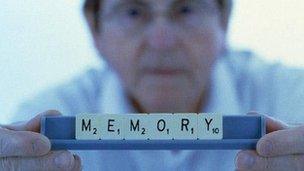Report highlights 'barriers' to dementia diagnosis
- Published

Many patients face "shocking" delays for dementia diagnosis and treatment, according to a report by MPs and peers.
The All-Party Parliamentary Group on Dementia says GPs are often seen as barriers to a diagnosis.
Its report says some people have to wait more than a year for an appointment at a memory clinic.
The Department of Health in England says the number of memory services is increasing.
The inquiry was set up to examine big discrepancies in dementia diagnosis rates. Across the UK it is estimated that only 43% of people with the disease have a formal diagnosis.
Scotland has the highest rate with 64.5%. In Northern Ireland it is 61.5% and in England it is 41%. The diagnosis rate is lowest in Wales, with 37.4%.
Poor understanding
The report says there is strong evidence to show the benefit of early diagnosis for people with dementia, their families, and also to the taxpayer.
This is reflected in official government policy across the UK, and was reinforced recently by Prime Minister David Cameron setting out his national dementia challenge for England.
But the inquiry highlights what it calls "barriers" to diagnosis and treatment, after looking at evidence submitted by more than 1,000 carers, GPs and hospital specialists.
These include poor public understanding of dementia. More than a third of carers who responded said the person with the condition had waited more than a year to go to their GP.
The report says many came to regard GPs as barriers to diagnosis rather than gatekeepers.
It also identifies big variations in access to memory services. Some people reported having to wait more than a year for an appointment at a memory clinic, while for others it was just a few weeks.
And it says people often received no information or support following diagnosis.
'Growing need'
In March this year the prime minister called for a dramatic increase in dementia diagnosis, as part of his strategy to deal with the disease as a "national crisis".
This included plans to increase public awareness, and to encourage GP referrals to memory clinics, for assessment, diagnosis and support.
The recommendations in the report include more training for GPs and other health workers, improved accreditation and more investment in memory services.
Jo Webber, from the NHS Confederation, said dementia was one of the biggest challenges facing the NHS.
"It is quite clear that every part of the health service is going to have to adapt to the needs of this growing group of patients - from the GP surgery to the hospital ward. We have to be honest and say we are not there yet."
The care services minister in England, Paul Burstow, agreed on the importance of early diagnosis.
"Some areas are doing fantastic work, but there is still too much regional variation.
"That is why we are driving forward measures to improve the quality of memory services, including work to increase the number of accredited... services and work to help local commissioners map the need in their area."
- Published4 May 2012
- Published26 March 2012
- Published21 May 2012